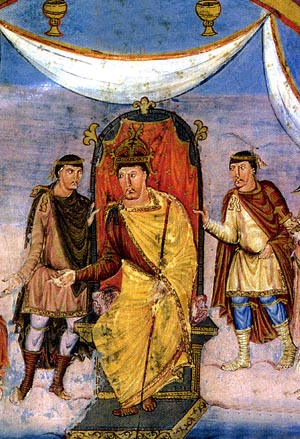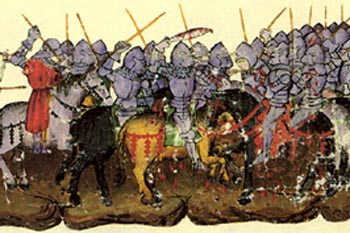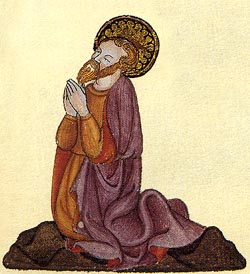 |
The Saint of the Day
St. Faro, October 28
Prof. Plinio Corrêa de Oliveira
Biographical selection:
Faro was born around the year 585 into a noble family in Burgundy, France. His sister was St. Fara, famous for her miracles and the Convent she founded.
Faro was raised in the court of King Thibert of Austrasia. In his youth he gave proofs of prudence and valor in battle that made him esteemed by his sovereign and other kings who governed France. In 613 Faro was invited to be one of King Clotaire II's Counsel. He married Blidechild, a princess of great virtue. He was a strong defender of the monarchy with all of its splendor. He played a notable role in the war against the Saxons.
He had the gift of counsel, which he used to help the unfortunate and oppressed. Two episodes, which were spread widely among the people of that time, illustrate this gift.

St. Faro was chosen a counselor of King Clotaire II and chancellor of King Dagobert
|
On a certain occasion some Saxon ambassadors visiting Austrasia responded insolently to Clotaire II. The King, furious, ordered them to be imprisoned and summarily executed. Faro interceded to postpone the execution for one day. During that night he visited the prisoners and exhorted them to convert to Catholicism so that they might not lose both their bodies and their souls. They listened to his words and received Baptism. On the following day, Faro spoke these words before the King and his Counsel: “These ambassadors are no longer strangers to the King, since they are now clothed in the white tunics of Baptism.” Surprised and touched by this news, Clotaire, a good Catholic, forgave them and sent them back to their country.
In another episode, Faro was accompanying Clotaire on a hunt. A poor woman approached, weeping and asking the King to help her in her needs. The King spurred his horse to a gallop to be free of the woman and continue the sport. Faro, whom the people called “the Knight of God,” followed the King and pled the woman’s cause with these words: “You are a King, and daily you ask God to help you in your needs, which is a good thing. This woman is doing something similar when she comes to you with her needs. She is asking you for much less than you ask from God. How can you think that He will listen to you if you do not listen to her?”
The King remained stubborn in his refusal, and then his horse threw him to the ground and he wounded his foot. Clotaire recognized the accident as a sign of God. He followed the advice of his counselor, and helped the woman.
Because of these and many other similar episodes, the fame of St. Faro spread and grew among the French people. He was a figure in almost all the popular songs of the time.
After a time, Faro and his wife agreed to live apart, and he became a monk. After her death, he was named Bishop of Meaux and was made a chancellor of King Dagobert I. On October 28, 675 he ended his days in the peace of the Lord.
Comments of Prof. Plinio:
This is a very beautiful selection. St. Faro lived a long time, developed many different qualities, held a variety of positions, and revealed an immense breadth of personality. To understand this excerpt about him, you should consider the situation of France at that time.

At that time France was a fractured country with many small kings who made wars against each other and invading barbarians |
France and Europe of that time were in a difficult situation. The Roman Empire had fallen, and the barbarian tribes had invaded all of Europe. They were not Catholics, but part Arians and part pagans. The kingdom of France, which had been united under Meroveus, was fragmented again. There were many small kingdoms in France, and therefore, many small kings. They were constantly fighting against themselves and against other barbarians coming from Germany and North Italy, and Arabs from Spain and Southern France.
In this situation all the nobles bore arms. The plebeians only fought in defense of the lands or towns where they lived. The nobles, however, could be convoked by the king to fight anywhere. They constituted the principal force in war. Chivalry was the weapon par excellence. Therefore, St. Faro, who was a noble, had two choices: to be a knight or a religious. The first part of his mission was as a layman, a knight. And since sanctity demands perfection in everything, he was a perfect warrior, he excelled in the role of warrior. You have to imagine him in the battle not only defending himself, but also attacking and killing the enemies, because no warrior can be excellent without doing this. He did it so well he was esteemed by his own king and all the other kings in the French territory. France was fragmented, but the fame of St. Faro and admiration for him spread throughout the entire French territory, creating an element for the future unification of the country.
When St. Faro fought for his Faith against pagans like the Saxons or Moors, his zeal would have been doubled since the fight for a religious ideal is one that engages the entire man and multiplies his strength. This is one probable reason why he was so famous and well-regarded
But he was not only a warrior. He was a man who knew how to handle situations of life. He married a princess, thereby raising his own social position and acquiring more influence in other parts of France. He was also a man who knew how to deal with kings. It was not by chance that he became a counselor of King Clotaire, and afterward a chancellor of King Dagobert. Today we don’t understand the importance of being a member of the King’s Counsel. At that time the entire life of a nation turned around the person of the monarch. Therefore, to be invited to be a counselor of the king was an opportunity to influence the destiny of the country. It was a very important position. The monarchs were responsible for almost every important decision so they used to consult often with their counselors, who were chosen with care. Therefore, to be invited to join the King’s Counsel also represented a great honor.
A counselor of the king of that time is more or less what a minister is today. You can see that St. Faro had a very elevated position; above him was only the king. But he was not moved by ambition for a career or other human glory. He had a desire to leave the world and serve only Our Lord. As soon as his duty to the king had been fulfilled, he chose to leave the things of this world to become a monk. This lack of ambition gives a state of soul that makes one a great counselor of kings.

He left the things of this world to become a monk |
The good counselor is not the one who says pleasant things to gratify the king. Rather he is one who above all tries to influence the king to follow the path to eternal life, showing him what his duty is before God and the Catholic Church. After that, the role of the counselor is to have a political sense and understanding of situations in order to advise the king in matters of war or peace, the treatment of adversaries, the handling of finances, the organization and tonus of the court, how he should present himself in order to be a Catholic model, and so on. All this was included in the role of counselor. All this St. Faro did with excellence, and for that reason he was chosen to advise King Clotaire, and after that, to be the chancellor of King Dagobert.
The two episodes, very picturesque and a little barbarian, illustrate well the ambience of healthy simplicity of the times in which St. Faro developed his skills and spread the supernatural graces that accompanied his actions. These episodes show us that whatever the Saint touched, a marvel followed. His life is for us a kind of a picture in a stained-glass-window through which the sun of grace shines.
Today, centuries after his death, a meeting is being made to honor him. So long as this world exists, from time to time the life of St. Faro will be recounted and admired. The fame of the saints on earth is a symbol of the glory they have in eternity.
St. Faro from the Heaven is following us at this very moment while we are talking about him. What should we ask him? We should ask him to give us his piety, his faith, his combativeness and his gift of counsel to accomplish our duty in the service of Our Lady.


  | | Prof. Plinio Corrêa de Oliveira | |
The Saint of the Day features highlights from the lives of saints based on comments made by the late Prof. Plinio Corrêa de Oliveira. Following the example of St. John Bosco who used to make similar talks for the boys of his College, each evening it was Prof. Plinio’s custom to make a short commentary on the lives of the next day’s saint in a meeting for youth in order to encourage them in the practice of virtue and love for the Catholic Church. TIA thought that its readers could profit from these valuable commentaries.
The texts of both the biographical data and the comments come from personal notes taken by Atila S. Guimarães from 1964 to 1995. Given the fact that the source is a personal notebook, it is possible that at times the biographic notes transcribed here will not rigorously follow the original text read by Prof. Plinio. The commentaries have also been adapted and translated for TIA’s site.
|
Saint of the Day | Home | Books | CDs | Search | Contact Us | Donate

© 2002- Tradition in Action, Inc. All Rights Reserved
|
 |

|